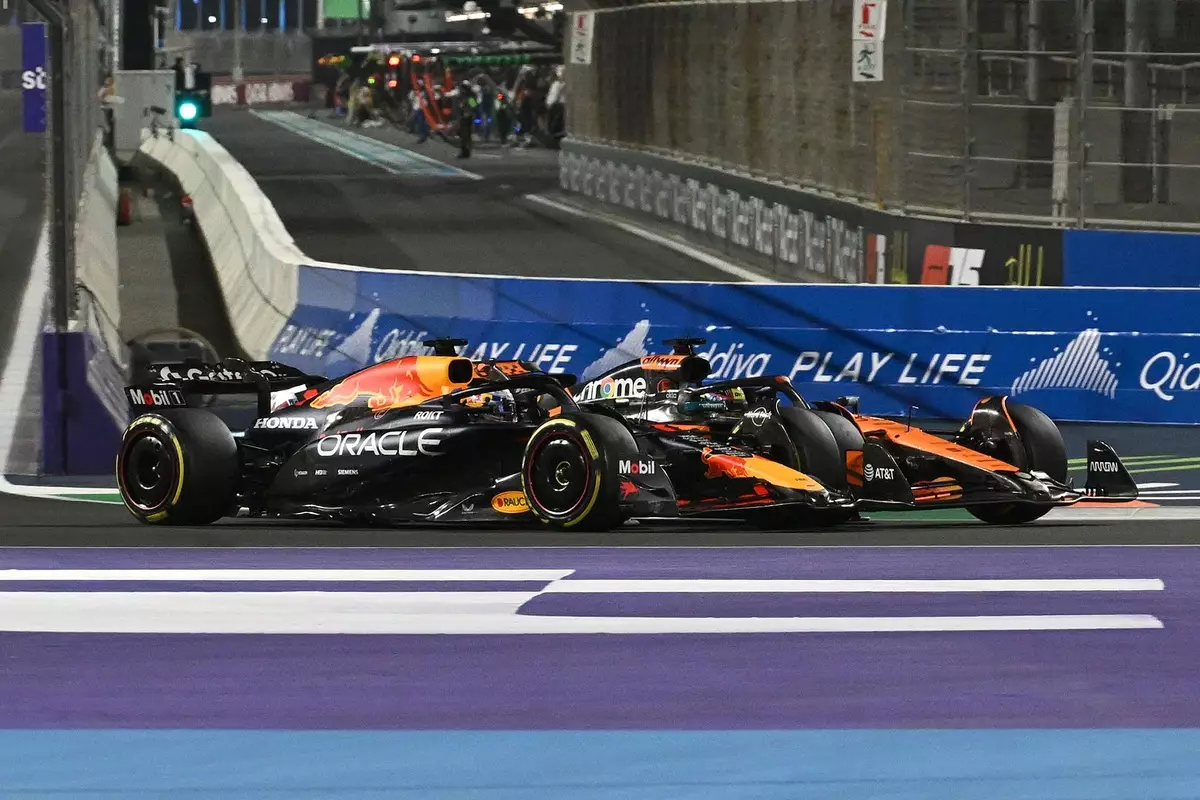Max Verstappen’s five-second penalty during the Saudi Arabian Grand Prix has reignited the perennial debate surrounding racing regulations and their enforcement. The incident, which occurred shortly after the race commenced, saw the Dutch driver leaving the track while attempting to gain an advantage against McLaren’s Oscar Piastri. In a split-second decision that would prove contentious, Verstappen chose not to relinquish his lead back to Piastri, asserting that he had been forced off by his competitor. The race stewards, however, took a contrasting stance, imposing a penalty that ultimately cast a shadow over Verstappen’s performance despite his eventual victory.
The ruling from the FIA stewards regarding Verstappen’s off-track excursion was based on their assessment that he had gained an unauthorized advantage. This penalty served not only as an obstruction to Verstappen’s race but also sparked a wave of outrage from the Red Bull team. Racing aficionados are well aware that moments like these—in which the lines between acceptable driving and rule violations appear muddled—can drastically alter the narrative of an entire race and season.
Red Bull’s Response: Strategic Silence or Tactical Acceptance?
Following the debacle, Red Bull Racing, known for their fierce competitive spirit, announced that they would not pursue a right-of-review petition against the penalty. Team principal Christian Horner, visibly frustrated, was adamant about the team’s position yet lacked the optimism necessary to challenge the stewards’ ruling. In his remarks post-race, he highlighted the team’s intention to present additional onboard footage to the stewards, claiming this evidence would bolster their argument. However, his admission that their appeal was “highly unlikely” to succeed sent a clear signal that Red Bull, despite their grievances, is choosing to accept the decision.
This development raises an important question: Is Red Bull’s decision truly a tactical retreat, or does it signify a larger strategy to focus on forthcoming races where they can maximize their competitive edge? The acknowledgment of the stewards’ previous decisions—especially in light of McLaren’s recent failed right-of-review request—implies a calculated choice to conserve resources and energy for battles where they feel they can achieve more favorable outcomes.
A Growing Sense of Frustration Among Competitors
The discontent stemming from Verstappen’s penalty reflects a broader trend in Formula 1, where teams and drivers often express frustration towards inconsistent ruling in crucial moments. The FIA’s rules regarding the use of track limits and gaining advantages are intricate and can vary not only from race to race but also from situation to situation. This inconsistency invites scrutiny and a desire for clarity—both from competitors and fans, who find themselves caught in complicated narratives of fairness and competitive integrity.
For drivers like Lando Norris, who recently faced similar circumstances, the matter becomes even more pressing. The sentiment that decisions seem to disproportionately favor certain teams creates a frustrating environment during a sport already marked by high stakes and expectations. The question arises: How will the FIA address these frustrations while maintaining integrity in its discipline?
A Future of Racing: Navigating Complexity and Controversy
Looking ahead, Verstappen’s five-second penalty may serve as a case study not just for the 2024 season but for how Formula 1 intends to navigate the complexities of race regulations that govern high-speed, competitive environments. With teams like Red Bull now more hesitant to confront steward decisions, the regulatory body must critically assess its protocols and preparedness for adapting to rapidly evolving circumstances on the track.
The delicate balance between ensuring fair play and allowing for the thrilling unpredictability that characterizes Formula 1 is one fraught with challenges. As teams strive for a competitive advantage, the call for clarity and consistent application of rules has never been more evident. Only time will tell if the FIA can effectively mediate these needs while preserving the pulse of what makes racing so exhilarating. In a world of rapid technological advancements and fierce rivalries, fostering a fair environment may be the key to the sport’s enduring success.

